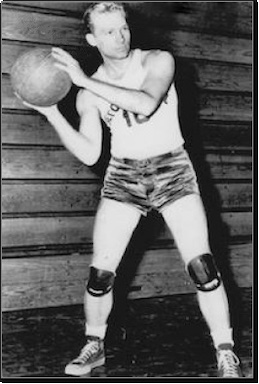
Sport: Basketball
Born: January 7, 1923
Died: April 8, 2024
Town: Jersey City, New Jersey
John Andrew Macknowski was born January 7, 1923 in the early days of Soviet Russia. His family moved to the US when he was a boy and settled in Jersey City, NJ where he was dubbed “Whitey” because of his blond hair and fair complexion. Whitey’s quickness and anticipation served him well on the city’s basketball courts, and he became the star of a club called the Young Demons and, later, of Lincoln High School. In 1941, he was the top scorer in Hudson County and was named honorable mention All-State as a 6’0″ guard. Among those ahead of him at guard was Larry Doby of Paterson Eastside.
Whitey was recruited by several college coaches and planned to attend George Washington University, but the day he was packing he received a telegram that someone else had received his scholarship. He went with Plan B and enrolled at Seton Hall; no one could have been more thrilled than coach Honey Russell. But there was a problem—because he was a commuter student, Johnny was told he’d have to pay $300 a semester for food. He and a friend cleaned out his locker and informed the school that he would be attending college somewhere else. The freshman team that year regularly beat the varsity, and the thought of going into the following season without Whitey was enough for Seton Hall to make the fee magically disappear—and give him a single room on campus the next day.
Whitey made the varsity in 1942–43. He was a starter alongside Bobby Wanzer and Pep Saul for a club that went 16–2. Whitey was an aggressive defender, good defensive rebounder, and possessed a long-range set shot that was accurate from the current-day 3-point distance. A solid ball handler, he was also adept a drawing fouls. The school suspended its basketball program the following year (for three seasons) and Whitey enlisted in the Navy. He served as an instructor at the Naval Training Base in Lakehurst and later at Sampson in upstate New York. He starred for both base basketball teams and, to earn a little spending money, fought in three-round boxing matches in New York City. He attained the rank of First Class Petty Officer.
Whitey was mustered out of the service in time to re-enroll at Seton Hall and win back his spot on the 1946–47 Pirates. He reunited with Wanzer and Saul to lead the team to a 24–3 record. The Hall went 18–4 in his senior year, but Whitey was suspended in March after playing four games for the Scranton Miners of the American Basketball League under an assumed name for $50 a game. For what it was worth, in his first game as a pro, Whitey led the Miners to victory over the Philadelphia SPHAs with a pair of clutch overtime buckets.
The Syracuse Nationals of the National Basketball League acquired Whitey’s rights in 1948 and he joined a powerhouse club that went 40–23 but lost in the playoffs to the Anderson Packers. The following year, the Nats joined the NBA as part of the merger between the Basketball Association of American and the NBL.
Player-coach Al Cervi appreciated Whitey’s veteran presence and long-range shooting. His physical defense was also top-notch; in an early game he was assigned to cover future Hallof Famers Bobby McDermott and held him scoreless. The Nationals finished in first place and advanced to the NBA Finals, where they met George Mikan and the Lakers. Whitey came off the bench in the first two games against Minneapolis, which the clubs split. Cervi started Whitey in place of Billy Gabor in Game 3 and he sank eight long set shots and finished with 25 points in a losing cause. Six-four Arnie Ferrin was guarding Whitey and could not do a thing to stop him. Despite averaging around 7 point a game during the season, he was second on the club in playoff scoring with over 13 points a game.
In 1950–51, Whitey played primarily in a reserve role, spelling Paul Seymour and Cervi. The Nats grabbed the last playoff spot in the East with a 32–34 record and ambushed the first-place Philadelphia Warriors in the opening round of the playoffs. Whitey shot well in the next round against the Knicks, but Syracuse lost 3 games to 2 when New York staged a furious fourth-quarter comeback in the finale.
Basketball players in this era made around $5,000 a year and worked off-season jobs to make ends meet. Whitey was no exception. In August 1951, he lost his balance on a construction scaffold and fell more than 20 feet, destroying his wrist and ending his pro career.
After his playing days, Whitey earned a Masters in Education at Montclair State and became a teacher in Parsippany, where he often went by Johnny-Mack. He also coached the Drew University hoops squad for seven seasons. In 1975, he was inducted into the Seton Hall Athletic Hall of Fame along with fellow hoops star Mickey Hannon, soccer All-American Billy Sheppel and baseball coach Al Mamaux.
Whitey retired to Tennessee in 1980 and in 2000 published Dynamics of Basketball: The Dawn of a New Era is Breaking Through.In 1996, he was inducted into the Hudson County Sports Hall of Fame in New Jersey. Before he died in 2024 at age 101, he was the oldest living NBA player.